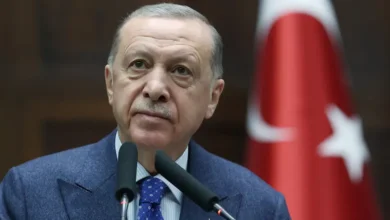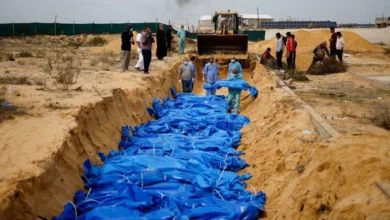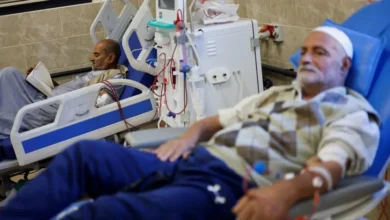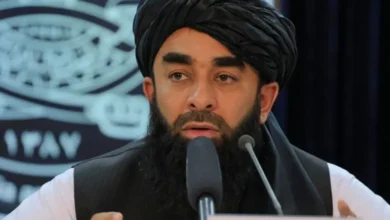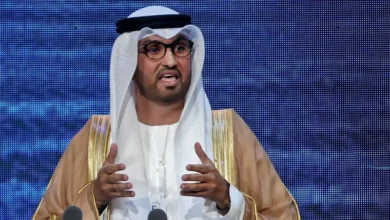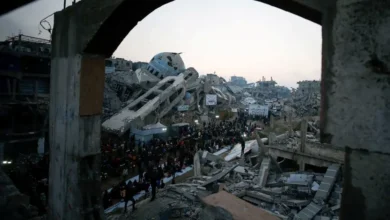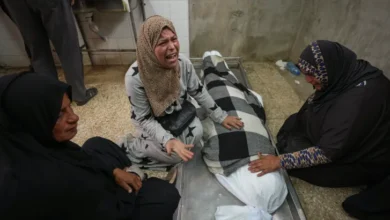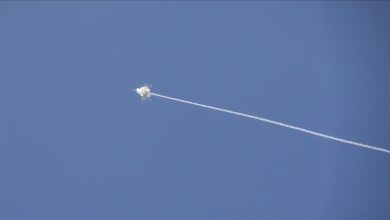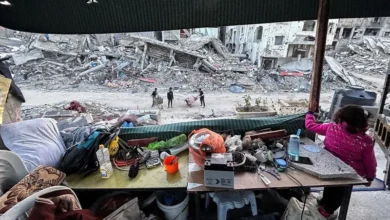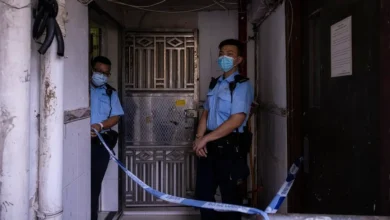Israel’s war on Gaza live: ‘All-out war’ feared after Lebanon pager blasts
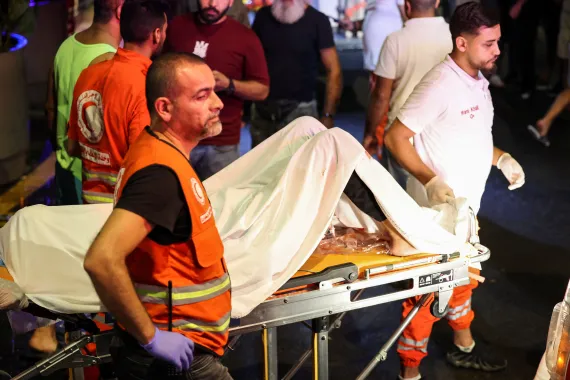
- Hezbollah says it will continue its “operations to support Gaza, its people, and its resistance” after simultaneous explosions of pagers used by its members killed 12 people and wounded thousands across Lebanon. Several wounded in neighbouring Syria.
- The Lebanese group vowed retaliation as it held Israel “fully responsible” for the attacks that left at least 200 people in critical condition. Israel has declined to comment on the detonations.
Palestinian man beaten by Israeli settlers in occupied West Bank
Israeli settlers attacked a Palestinian man in the village of Khallet al-Dabaa in Masafer Yatta, south of Hebron, in the occupied West Bank, Palestinian news agency Wafa reported.
Muhammad Dababseh was assaulted as Israeli soldiers stood nearby, the incident causing him injuries, the agency said.
Dababseh was later transferred to hospital for medical treatment, Wafa reported.
EU foreign affairs chief decries civilian casualties in Lebanon pager attacks
“Even if the attacks seem to have been targeted, they had heavy, indiscriminate collateral damages among civilians, including children among the victims,” Josep Borrell said.
“I consider this situation extremely worrying. I can only condemn these attacks that endanger the security and stability of Lebanon, and increase the risk of escalation in the region,” he added.
He said that the European Union wants to avert an all-out war because it would have “heavy consequences for the entire region and beyond”.
Who are the main regional groups involved in Israel’s war on Gaza?
The pagers’ blasts in Lebanon targeting the Hezbollah group have raised fears of a regional war. Several armed groups, some of them part of Iran’s so-called “axis of resistance” in the region, have stood in solidarity with Palestinians against Israel’s war on Gaza.
Here’s a look at the main ones:
Hezbollah: Hezbollah is a Shia political party as well as a movement based in Lebanon that defines itself as a resistance group pushing back against US and Israeli policies. It is a close ally of Iran and is thought to have more troops and be better equipped than the official Lebanese army.
Hassan Nasrallah, who has led the group for more than 30 years, has issued stern warnings to Israel since it attacked Gaza following the October 7 attack, saying Hezbollah would continue to wage attacks on Israeli soil for as long as the conflict continues. The group says it will stop its attacks if Israel stops its war on Gaza.
Houthis: The Houthi group based in Yemen has launched attacks on vessels in the Red Sea as a response to Israel’s bombardment of Gaza. Also known as Ansar Allah (supporters of God), it controls most parts of Yemen, including the capital, Sanaa, and some of the western and northern areas close to Saudi Arabia. The group should not be seen as an Iranian proxy, as it has its own base, its own interests and ambitions.
Kataib Hezbollah: This is a major Iran-aligned armed group that is part of the umbrella group Islamic Resistance in Iraq. It has carried out several attacks on Israel as well as on US bases in Iraq and Syria since the start of the Gaza war on October 7.
Kata’ib Sayyid al-Shuhada (KSS): The Iran-backed Iraqi armed group KSS has been launching attacks on US interests which it links to Israel in Iraq and Syria. It was originally part of Kataib Hezbollah from 2003 to 2011, but has since become a group of its own.
Lebanon Health Ministry worried about an ‘all out war’
The [Lebanese] health minister was keen to point out that this attack really put intense pressure on the actual health service and the emergency response.
He said the total injured are between 2,750 and 2,800. At least 300 of those are in critical condition. Many of them are in intensive care units.
The ministry said that people were taken to at least 100 hospitals across the country. Up to 1,084 ambulances were pressed into action to cater to the unprecedented attacks.
There was also a regional response that he talked about; very keen to point out that aid had been sent from Iran, Jordan and Iraq so far, with more expected to arrive.
He also said that the attack has had a profound significance… We, as a health service, have to be prepared, he said.
The minister also talked about making sure that the preparedness, which at the moment is between about three and six months, actually goes up to longer than that.
They are worried clearly about escalation, about an all out war, and they’re talking now about being prepared for that.
Ceasefire in Gaza ‘a question of political will’: Blinken
US Secretary of State Antony Blinken has said an agreement on a ceasefire in Gaza between Israel and Hamas was “less a question of substance and more a question of political will”.
Speaking at a press conference in Cairo alongside Egyptian Foreign Minister Badr Abdelatty, Blinken said 15 of the 18 points in the agreement had been agreed upon.
Abdelatty said the absence of political will “on one particular side” was keeping the negotiations from moving forward.
Commenting on the simultaneous explosion of pagers in Lebanon, both leaders stressed that all parties should refrain from actions that could spiral tensions into a broader conflict and that a ceasefire in Gaza was necessary to defuse tensions in the region.
Blinken added that US did not know about and was not involved in the attack in Lebanon and was “still gathering the facts.”
Medical staff, children among those killed in pager blasts: Health Ministry
Lebanon’s Minister of Health Firass Abiad has held a media conference in Beirut on the situation in the aftermath of the pager blasts.
Abiad said many of those carrying the pagers were civilians. At least 12 people have been killed, including four medical staff, an eight-year-old girl and an 11-year-old boy.
The attack showed that Israel was “steering away from a diplomatic solution,” Abiad said. “We have to be ready and alert.”
The minister said the biggest challenge was to bring medical sector to a “situation of preparedness”, which includes increasing stockpiles of medicines and fuel.
Hospitals also needed to recover from the massive influx of patients overnight. Abiad said each hospital received 70 to 100 patients in the aftermath of the attack, which was “massive for any country”.
